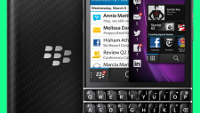Inside the BlackBerry soap opera

Canadian paper The Globe and Mail ran quite a story on the inner workings of that handset manufacturer in Waterloo known as BlackBerry. A corporate soap opera, the story showed how certain decisions made by current management might have doomed the company. One potentially killer mistake made by the current management team led by CEO Thorsten Heins, was to release the all-touch BlackBerry Z10 as the first new BlackBerry 10 model instead of the QWERTY equipped BlackBerry Q10. Former co-CEO and RIM founder Mike Lazaridis wanted the Q10 to launch first because of the familiar physical keyboard on the phone.
During a board meeting last year, newly named CEO Heins showed off the BlackBerry Z10 to the board. Lazaridis was immediately upset with the handset. Pointing out a BlackBerry model with a QWERTY keyboard, Lazaridis said "I get this, It’s clearly differentiated.” Pointing to a touchscreen phone, the director said, "I don't get this." One could argue that Lazaridis' comment was just a newer version of other comments he and co-CEO Jim Balsillie made after the launch of the Apple iPhonethat showed both to be in denial about touchscreen phones. But in this case, he might have been right (more on this later).
Heins' team had its way and he later said that the Z10 was harder to produce which is why he wanted it to be launched before the Q10. But BlackBerry was also losing its fabled enterprise business to Apple and Samsung who were scoring big with employees allowed to bring their own device to work. The CEO hoped that the BlackBerry Z10 would staunch the bleeding. But what he didn't understand was that people weren't leaving BlackBerry because the competition had a touch screen, people were leaving BlackBerry because of the capabilities of iOS and Android.
Heins infuriated the other former co-CEO at BlackBerry when he shot down Jim Balsillie's plan to get carriers to replace SMS on handsets with BBM. It was a brilliant idea at the time, and could have brought oodles of cash into the company coffers. But Heins and Lazaridis combined to block the move and this led to Balsillie's departure from RIM's board. Ironically, BlackBerry is now in the midst of a project which has been delayed, to have BBM made available as a free app for iOS and Android users.
The article goes on to add that what appeared to be pronouncements against the iPhone after it was originally launched that made him look out of touch, Mike Lazaridis was actually in awe over the device. He remembers telling his staff, "If that thing catches on, we’re competing with a Mac, not a Nokia." In June 2007, Verizon approached BlackBerry about producing an "iPhone killer". The result was the first touchscreen 'Berry, the BlackBerry Storm. And even with the phone's disappointing launch, by August 2009 RIM was still the fastest growing company in the world according to Fortune, and 4 out of 5 U.S. consumers planned on buying a BlackBerry for their next smartphone.
But the gang at Waterloo didn't expect what happened next. The Motorola DROID came out and this was the iPhone challenger that Verizon and its customers were longing for. Named the Time Magazine gadget of the year for 2009, the first device running Android 2.0 beat out the Apple iPhone 3GS for that award. This should have been good news for BlackBerry. Android and iOS would split the touchscreen market and the Canadian based firm would get a majority of the rest. But instead, the touchscreen market expanded dramatically and the smartphone world soon was split in a battle reminiscent of the Hatfields and McCoys. By December 2010, Android had 23.5% of the U.S. smartphone market, up from just 5.2% the year before. By the next year, Android had over 47%. BlackBerry had lost 10% of its share in 2010 to 31.6% and dropped to 16% a year later.
source: GlobeandMail via Engadget
"The problem wasn’t that we stopped listening to customers. We believed we knew better what customers needed long term than they did. Consumers would say, ‘I want a faster browser.’ We might say, ‘You might think you want a faster browser, but you don’t want to pay overage on your bill.’ ‘Well, I want a super big very responsive touchscreen.’ ‘Well, you might think you want that, but you don’t want your phone to die at 2 p.m.’ “We would say, ‘We know better, and they’ll eventually figure it out.’ "-Anonymous former RIM insider
The article goes on to add that what appeared to be pronouncements against the iPhone after it was originally launched that made him look out of touch, Mike Lazaridis was actually in awe over the device. He remembers telling his staff, "If that thing catches on, we’re competing with a Mac, not a Nokia." In June 2007, Verizon approached BlackBerry about producing an "iPhone killer". The result was the first touchscreen 'Berry, the BlackBerry Storm. And even with the phone's disappointing launch, by August 2009 RIM was still the fastest growing company in the world according to Fortune, and 4 out of 5 U.S. consumers planned on buying a BlackBerry for their next smartphone.
source: GlobeandMail via Engadget
Follow us on Google News













Things that are NOT allowed:
To help keep our community safe and free from spam, we apply temporary limits to newly created accounts: